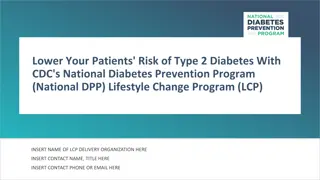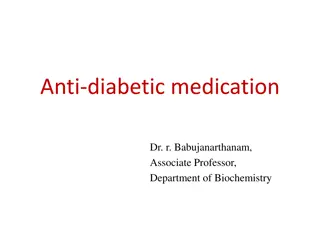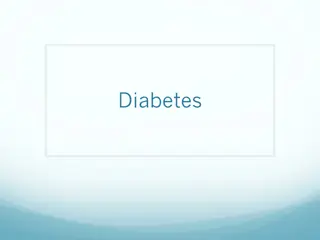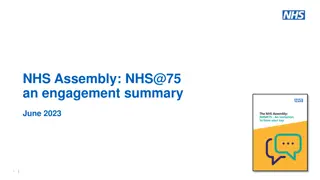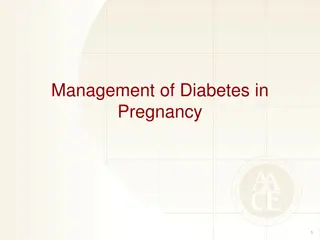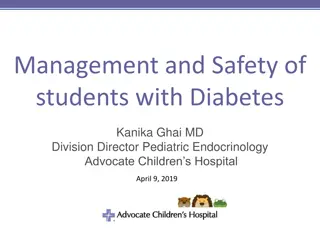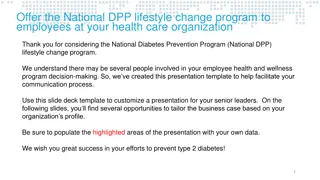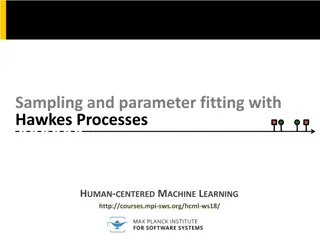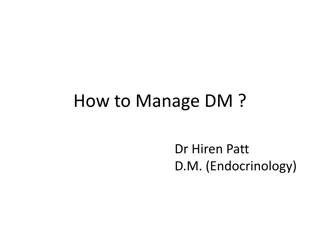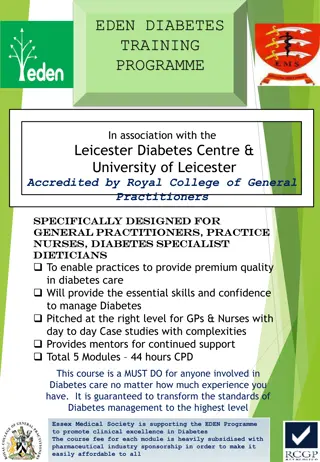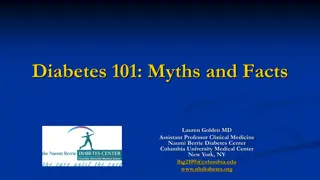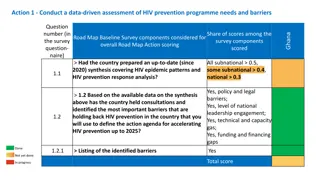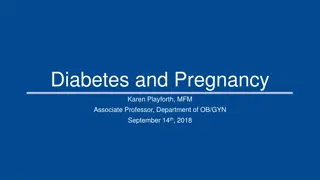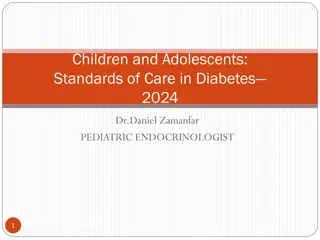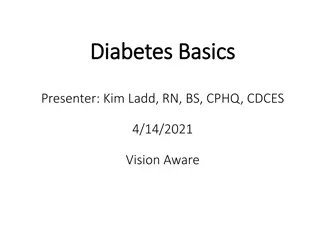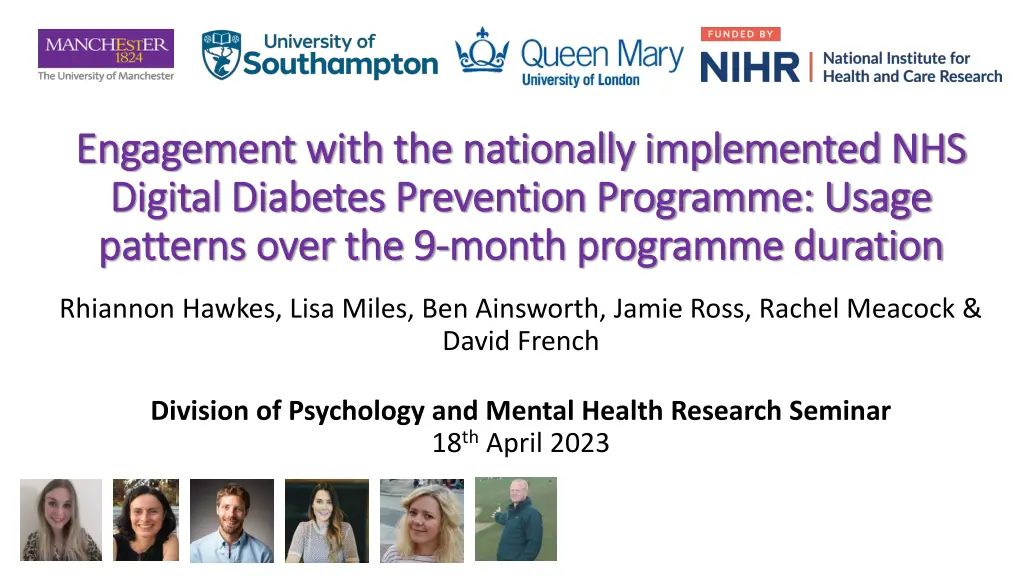
Engagement Patterns in NHS Digital Diabetes Prevention Programme
Explore the engagement patterns in the nationally implemented NHS Digital Diabetes Prevention Programme over a nine-month duration. Analyze user interactions, content delivery, and program features across different providers to understand user engagement levels. The study aims to describe the duration of app engagement, overall frequency of program feature usage, engagement patterns over time, and differences between NHS DDPP providers.
Download Presentation

Please find below an Image/Link to download the presentation.
The content on the website is provided AS IS for your information and personal use only. It may not be sold, licensed, or shared on other websites without obtaining consent from the author. If you encounter any issues during the download, it is possible that the publisher has removed the file from their server.
You are allowed to download the files provided on this website for personal or commercial use, subject to the condition that they are used lawfully. All files are the property of their respective owners.
The content on the website is provided AS IS for your information and personal use only. It may not be sold, licensed, or shared on other websites without obtaining consent from the author.
E N D
Presentation Transcript
Engagement with the nationally implemented NHS Engagement with the nationally implemented NHS Digital Diabetes Prevention Programme: Usage Digital Diabetes Prevention Programme: Usage patterns over the 9 patterns over the 9- -month programme duration month programme duration Rhiannon Hawkes, Lisa Miles, Ben Ainsworth, Jamie Ross, Rachel Meacock & David French Division of Psychology and Mental Health Research Seminar 18th April 2023
A National Digital Diabetes A National Digital Diabetes P Prevention P Programme rogramme revention 2019: Digital pathway introduced Delivered by 4 digital provider organisations 2020: 2016: Those referred offered choice between F2F and digital programme Nationally implemented behaviour change programme F2F group sessions NHS England programme specification
Digital Programme Delivery Digital Programme Delivery App Health coaching Educational content
Service Delivery and Fidelity Service Delivery and Fidelity In their digital programmes, providers offered 80% of key intervention content in the NHS programme specification. 43% via app delivery 74% via educational materials 62% via health coaching But to what extent do users engage with this content? Hawkes et al., 2023. What behaviour change technique content is offered to service users of the nationally implemented English NHS Digital Diabetes Prevention Programme: Analysis of multiple sources of intervention content. Preventive Medicine Reports, 32;102112.
Research Aims and Objectives Research Aims and Objectives To understand engagement with the NHS DDPP for a cohort of service users enrolled with 3 NHS DDPP providers over the nine-month programme duration 1. Describe duration of engagement on the app 2. Describe overall frequency of use of programme features 3. Describe patterns across time in engagement with programme features over the nine-month programme duration 4. Compare any differences in engagement with programme features between NHS DDPP providers over time
M Methods ethods Obtained routinely collected usage data from 1,826 users enrolled on the DDPP between December 2020-June 2021 for 3 providers Provider A Provider C Provider D Cohort of service users (date range) New registrants starting NHS DDPP between 20/05/2021 and 19/06/2021 New registrants starting NHS DDPP between 01/12/2020 and 28/02/2021 New registrants starting NHS DDPP between 01/12/2020 and 28/02/2021 No. of service users 940 283 603 Engagement with key intervention features of the DDPP: Self-monitoring Goal setting Receiving information (via educational articles) Social support (via health coach and group forum) And time spent on app
Results: Time spent on app Results: Time spent on app App usage decreased over time across the providers 400 minutes spent on the Median number of 300 Provider A 200 app Provider C 100 Provider D 0 1 2 3 4 5 6 7 8 9 Engagement period Variation identified in engagement across provider programmes identify programme features that promoted engagement
Results: Self Results: Self- -monitoring monitoring Users primarily used the apps to self-monitor behaviours (e.g. PA, diet) and access educational content Self-monitoring: 70 behaviours were self-monitored 60 Median number of times 50 40 30 20 10 0 1 2 3 4 5 6 7 8 9 1 2 3 4 5 6 7 8 9 1 2 3 4 5 6 7 8 9 Provider A Provider C Provider D Engagement period and provider
Results: Educational content Results: Educational content Users primarily used the apps to self-monitor behaviours (e.g. PA, diet) and access educational content Educational content: 30 Median number of times articles 25 20 were accessed 15 10 5 0 1 2 3 4 5 6 7 8 9 1 2 3 4 5 6 7 8 9 Provider A Provider D Engagement period and provider
Results: Health coach support Results: Health coach support User engagement findings Self-monitoring Users on provider C s programme more frequently self- monitored their behaviours. Provider programme feature Messages from their health coach with tailored feedback on behaviours monitored. Goal setting Users on provider A s programme set or amended goals more frequently throughout the nine-months. Monthly telephone calls with a health coach. Group support Users on provider D s programme sent more peer messages via the group chat during the first three months of the programme. The closed group chats were moderated by health coaches for the first three months of the programme.
Summary Summary Differences in engagement likely due to programme differences across provider (particularly health coach support) App usage decreased over 9 months, but magnitude of decrease varied across providers Users primarily used the app to self-monitor behaviours and access educational content, group support content rarely used Health coach support that was linked to specific features (e.g. goal setting and self-monitoring) was associated with higher engagement with that intervention feature
Implications Implications Engagement followed similar usage pattern seen in trials of digital DPPs, and compares favourably with F2F DPP This study highlights what intervention features users engaged with engagement is linked with intervention effectiveness Literature suggests group support associated with weight loss in digital DPPs users in DDPP missing out on key intervention component? Need to look at associations between programme feature usage and outcomes Importance of human element in digital behaviour change interventions
Outputs from the evaluation of the Outputs from the evaluation of the NHS DDPP NHS DDPP Hawkes RE, Miles LM, French DP. Fidelity to programme specification of the National Health Service Digital Diabetes Prevention Programme behaviour change technique content and underpinning theory: Document analysis. J Med Int Res. 2022;24(4):e34253. Miles LM, Hawkes RE, French DP. Description of the nationally implemented National Health Service Digital Diabetes Prevention Programme intervention and rationale for its development: Mixed methods study. BMC Health Services Res. Hawkes RE, Miles LM, French DP. What behaviour change technique content is offered to service users of the nationally implemented English NHS Diabetes Prevention Programme: Analysis of multiple sources of intervention content. Preventive Medicine Reports. 2023;32:102112. Miles LM, Hawkes RE, French DP. How is the behaviour change content of a nationally implemented Digital Diabetes Prevention Programme understood and used by participants? A qualitative study of fidelity of receipt and enactment. J Med Int Res. 2023;25:e41214. Hawkes RE, Miles LM, Ainsworth B, Ross JA, Meacock R, French DP. Engagement with a nationally-implemented digital behaviour change intervention: Usage patterns over the 9 month duration of the National Health Service Digital Diabetes Prevention Programme. Under review. Cheung WC, Miles LM, Hawkes RE, French DP. Experiences of online group support for engaging and supporting participants on the National Health Service Digital Diabetes Prevention Programme: A qualitative interview study. Under review. Evans TE, Hawkes RE. Working with stakeholders to translate health psychology research into practice: Reflections from evaluations of two national behaviour change programmes. Under review.
Acknowledgements This research is funded by the National Institute for Health and Care Research (Health and Social Care Delivery Research (HSDR) Programme, 16/48/07 Evaluating the NHS Diabetes Prevention Programme (NHS DPP): the DIPLOMA research programme (Diabetes Prevention Long Term Multimethod Assessment)) The views and opinions are those of the authors and do not necessarily reflect those of the National Institute for Health and Care Research or the Department of Health and Social Care. For more information about DIPLOMA: www.clahrc-gm.nihr.ac.uk/projects/diploma-evaluation-national-nhs-diabetes-prevention-programme Rhiannon.Hawkes@manchester.ac.uk @RhiannonHawkes


